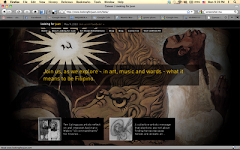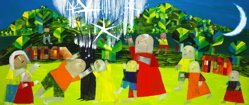 It could all begin with the fact that we are an archipelago, a collection of islands - some big, some small, some gone when the tide is up - separated from one another, and bound together only by legal fiction.
It could all begin with the fact that we are an archipelago, a collection of islands - some big, some small, some gone when the tide is up - separated from one another, and bound together only by legal fiction.Similarly, as a people, we are more like a collection of tribes or regions or provinces. It is easier to talk about the traits, quirkiness and stereotypes (fair and unfair) of Batanguenos or Ilocanos or Ilonggos or Muslims or the people from Imperial Manila, than it is to define what exactly it is to be a Filipino.
 So ask the ordinary man or woman on the street what binds all these disparate folks together beyond an arguably common shared history, and we will get various, even conflicting, responses.
So ask the ordinary man or woman on the street what binds all these disparate folks together beyond an arguably common shared history, and we will get various, even conflicting, responses.There are our traits. Are we condemned by crab mentality? Or are we uplifted by our sense of bayanihan?
Are we famously resilient because we can laugh at ourselves and our problems? Or are we hopelessly hampered by an inability to take things seriously - laughing even when there is nothing to laugh about?
Is our faith - and the Church - our saving grace, or our ironic cross?
Who is Juan? Who is Juana? Or maybe it is the name itself - Juan is a Spanish name, one that did not exist in these Islands before we were conquered. Do we reject “Juan” as a non-Filipino name? Or do we embrace it as an undeniable part of who we are today given our history?
It is easy to stereotype the OFW as a prototypical Filipino today. Counting OFWs and their friends and loved ones left behind, they comprise a huge majority of our population who share common experiences - the displaced sense of family, the heroic notion of sacrifice, the pasalubongs when one returns, the jeepney loads of relatives that accompany them to the airport when they leave, and of course, the remittances that collectively keep this country afloat.

And yet, we all know the Filipino is more than just the OFW. There are millions of farmers and fisherfolk, thousands of youthful call center agents and ICT workers, and dwindling numbers of indigenous peoples. They, too, are Filipinos.
So, what does it mean to be Filipino? What does it matter? Why does it matter?
The answer to this question is important, not least because the lack of a common and shared sense of identity could be one major reason why we cannot seem to get our acts together, and live up to our full potential as a nation.
This is a basic theme that we should explore and discuss, and most importantly, pose to anyone (especially the young) who might listen - if only so that they will not take their identity for granted.
Unfortunately, the question also often sounds hackneyed (gasgas na gasgas na) and, indeed, corny. Worse, many times even, the people calling for unity (many of them in government, the church and the media) are only self-interested, and are those we would really rather ignore.
 We need to ask the question, and to propose some answers - but in a manner that is not off-putting or intimidating, and in a way that allows people to seek and find the answers just for themselves without feeling awkward or forced.
We need to ask the question, and to propose some answers - but in a manner that is not off-putting or intimidating, and in a way that allows people to seek and find the answers just for themselves without feeling awkward or forced.The Center for Art, New Ventures and Sustainable Development’s (CANVAS) Looking for Juan Outdoor Banner Project - opening at the University of the Philippines’ Academic Oval on Independence Day (June 12, 2009) - is an attempt to provide that venue, that opportunity.
We asked dozens of artists, writers, musicians and poets to provide - through their art, words and music - their answers to the question - What Does It Mean to Be Filipino? Their responses were then transformed into art banners and will be displayed so that people can enjoy them as they walk, bike or drive around a 2.2 kilometer oval under the magnificent acacia trees of the University of the People.
It is an engaging, and completely relaxed environment, especially on Sundays when the whole place is closed to traffic, and joggers jog, children play, and families come out to relax and just be with one another. It will be fun, and we hope to see you there.
And best of all - the answers (and sometimes even more questions) are given - almost subliminally - by artists, writers, poets and musicians who, by definition, are engaged in work and lifestyles that force them to think and express thoughts and things bigger than they are.
We also like to think that this show is even more special in that, collectively, it gives a snapshot of what some of the best young creative talents think when asked about what it means to be Filipino, at this particular point in our nation's history.
In the end, of course, there is no single correct answer to the question, “What does it mean to be Filipino?”
Which is as it should be, because for many of the important issues confronting us today - as individuals and as a nation - understanding the questions is often more important than providing the answers.
A Happy and Meaningful Independence Day to All!

The Looking for Juan Outdoor Banner Exhibit will be on view from June 12 to July 11, 2009 around the University of the Philippines’ Academic Oval in Diliman, Quezon City.
At the end of its run, the banners will be converted into tote bags by two women’s communities in Antipolo and Laguna, and sold as original works of functional art. Proceeds from the sale will benefit PADYAK - a UP Mountaineers-led movement to promote cycling and environmentalism as healthy lifestyles, as well as other CANVAS efforts to promote greater awareness and appreciation for Philippine art, culture and the environment.

The Looking for Juan Outdoor Banner Project is made possible in part by generous support from The Pag-IBIG Fund.





No comments:
Post a Comment